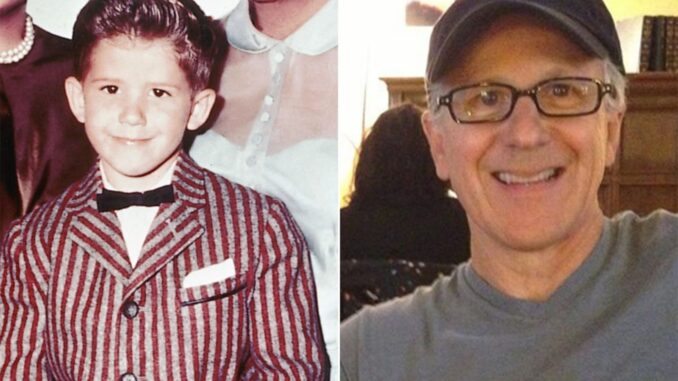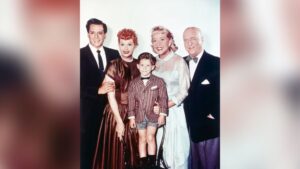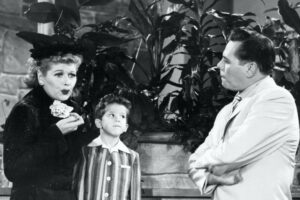
Desi Arnaz was not just the co-star of one of the most beloved television shows of all time, I Love Lucy, but also its producer and co-creator. Alongside his real-life wife, Lucille Ball, Arnaz built a television empire that broke barriers and set standards for generations to come. But one decision that puzzled fans for years was why he chose not to cast his own son, Desi Arnaz Jr., as ‘Little Ricky,’ his on-screen child. On the surface, it seems like a natural choice, but there’s more to the story than meets the eye.

1: The Character of ‘Little Ricky’ in “I Love Lucy”
‘Little Ricky,’ the son of Lucy and Ricky Ricardo, became an essential part of the I Love Lucy storyline. As the show progressed, fans became emotionally invested in the Ricardo family, and with the birth of Little Ricky, the show mirrored real-life events as Lucille Ball had given birth to her own son.
But why did Desi Arnaz, known for his close-knit family values, make the unusual decision to not cast his actual son in this role?
2: The Initial Buzz Around Casting ‘Little Ricky’
In the 1950s, the media was abuzz with excitement over I Love Lucy and the real-life birth of Desi Arnaz Jr. Fans and entertainment industry insiders alike assumed that Desi Jr. would naturally step into the role of Little Ricky. After all, it seemed like a seamless way to blend fiction with reality. But to everyone’s surprise, Arnaz chose a different path.
3: Desi Arnaz Jr. – A Star from Birth
Desi Arnaz Jr. was a star even before he was born. The episode of I Love Lucy that featured Lucy giving birth to Little Ricky aired on the same day Lucille Ball gave birth in real life. This event drew in 44 million viewers—more than President Eisenhower’s inauguration! Arnaz Jr. became an instant celebrity.
But despite this early fame, Arnaz and Ball were mindful about thrusting their child into the limelight too soon.
4: The Pressure of Fame on Children in Hollywood

Being a child star in Hollywood is notoriously tough. The pressures can be overwhelming, and many child actors struggle with the transition to adulthood. Desi Arnaz understood this firsthand. Though Arnaz Jr. had some level of stardom due to his family’s fame, Desi Sr. wanted to protect his son from the all-consuming nature of Hollywood.
5: Desi Arnaz’s Protective Nature as a Father
Arnaz was not just a television producer—he was also a father. And like many parents, he wanted to shield his children from unnecessary pressures. The decision not to cast Desi Jr. as Little Ricky was rooted in love and concern. Arnaz knew that television stardom could bring about immense pressure, and he wanted to allow his son to have as normal a childhood as possible.
6: Concerns About Overexposure
One of the major reasons Arnaz chose not to cast his son was the fear of overexposure. By the time Little Ricky was to be cast, Desi Arnaz Jr. was already well-known in media circles. Casting him in such a prominent role would have further heightened the spotlight on him, potentially at the cost of his personal development.
7: Finding the Perfect Actor for Little Ricky
Desi Arnaz and Lucille Ball were both deeply invested in the success of I Love Lucy. They wanted the best for the show, which meant casting the right actor for every role, including Little Ricky. After an exhaustive search, they eventually cast Keith Thibodeaux, who became famous as Little Ricky.
Thibodeaux had the musical talent (he played drums, just like Little Ricky) and the right chemistry with the rest of the cast, which made him a perfect fit for the role.
8: Keith Thibodeaux’s Audition: Why He Won the Role
Thibodeaux’s audition was impressive not just because of his talent but also his demeanor. At just five years old, he had a certain charisma and confidence that made him a natural fit for the role. His ability to play the drums, an essential skill for the character, helped him clinch the role, winning over Arnaz and Ball.
9: Desi Arnaz’s Professionalism on Set
Another reason Arnaz may have chosen not to cast his son is professionalism. As a producer, he understood the complexities of mixing family and work. Casting his own son could have blurred the lines between his role as a father and his role as a producer, potentially leading to tension on set. Instead, by choosing an external actor like Thibodeaux, Arnaz ensured that the show remained professional and that family dynamics were kept separate.
10: The Long-Term Impact on Desi Arnaz Jr.
In retrospect, many believe that Arnaz made the right choice. Desi Arnaz Jr. went on to have his own successful career in acting and music. By not casting him as Little Ricky, Arnaz gave his son the freedom to carve out his own identity, rather than being defined by his parents’ iconic roles.
11: The Fine Line Between Personal and Professional Life
Arnaz understood that by allowing his son to grow up out of the immediate glare of the television cameras, he was helping him maintain a healthier balance between personal and professional life. This foresight helped Desi Arnaz Jr. lead a successful and grounded career later in life.
12: The Legacy of Little Ricky on “I Love Lucy”
Despite not casting his son, Desi Arnaz’s decision paid off in more ways than one. Keith Thibodeaux’s portrayal of Little Ricky became iconic, and the chemistry between the cast members remained authentic. The decision added to the show’s credibility and legacy, which continues to be cherished by fans to this day.
13: Was There Ever Regret?
Did Desi Arnaz ever regret not casting his son? While it’s impossible to know for sure, based on interviews and public comments, it seems Arnaz stood by his decision. He remained committed to providing his son with the space to grow, and in doing so, he may have prevented some of the common pitfalls that other child stars faced.
14: Desi Arnaz Jr.’s Reflections on His Father’s Decision
Over the years, Desi Arnaz Jr. has spoken fondly about his parents and their decisions regarding his upbringing. While he did eventually pursue acting, he has expressed gratitude for the measured approach his parents took in protecting him from the pressures of early fame.